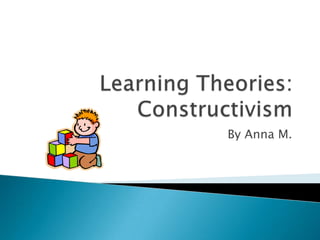
Learning Theories: Constructivism
- 1. By Anna M.
- 2. “A type of learning in which the learner forms, or constructs, much of what he or she learns or comprehends” (Shelly 376) “A paradigm or worldview posits that learning is an active, constructive process” (“Constructivism”) Students learn through doing the task, rather than listening to or seeing it They will understand the topic much better by using critical thinking skills to complete the task and therefore it will more efficiently teach the students
- 3. “Piaget’s Stage Theory of Cognitive Development ◦ a description of cognitive development as four distinct stages in children” (“Stage Theory”) ◦ Sensorimotor Stage: Ages 0-2; infant learns through imitation using sense and motor activities ◦ Preoperational Stage: Ages 2-6; child is “egocentric” and begins to use “concrete thinking” and “intuitive reasoning” (Shelley 377) ◦ Concrete Operations: Ages 7-12; child solves problems and thinks abstractly using logic ◦ Former Operations: Ages 12+; child thinks abstractly and using deductive logic while testing hypotheses He felt children learned more as they experienced more and then applied their experiences to what they knew Jean Piaget by Boeree
- 4. “Proposed that learning is an active process” where the learner makes new ideas based off past knowledge (Shelley 378) They are participatory learners He felt that the curriculum would be best organized “in a spiral manner so that students continually build upon what they already have learned” (Shelley 379)
- 5. Theory of the “Zone of Proximal Development” ◦ Children worked better when in collaboration with an adult, whether the adult was teaching or not ◦ “Enabled them to refine their thinking or their performance to make it more effective” (Atherton) Developing a child’s language and articulation is key to the child’s ability to learn Learning is “influenced significantly by social development” (Shelley 379) Lev Vygotsky from “The Mozart of Psychology”
- 6. “Learning should engage and expand the experiences of the learner” (Shelley 381) He considered education to be more of a social process than anything else Progressive Education: “focused on educating the whole child, physically, mentally, and socially” (Shelley 382) It isn’t about just lecturing and listing facts, but the student has to actively be a part of the learning
- 7. “Teachers should engage students by providing activities that guide students and create opportunities for discussion or for using the Socratic method of learning” (Shelley 379) With and without technology, the teacher would have the student doing hands-on activities, such as using online programs to help them solve math or reading problems They may also have their students construct things to take measurements of and understand what they are building right in front of them Finally, teachers will teach by having the students “do” rather than “hear or see”
- 8. With and without technology, students will use critical thinking skills while analyzing a problem They may also create their own understanding of a problem to help them better understand it Students will complete a project step-by-step and analyze each part of it Finally, they will have their teacher available in case they need assistance, but the more they work on their own, the more information they will absorb
- 9. I would definitely prefer Constructivism to any of the other learning theories It allows the students to have a lot more hands on assignments instead of having to listen to me lecture on-and-on every class Constructivism allows the teacher and student to expand their knowledge by exchanging ideas and working to solve the problem I think the students would be much better off by being a more active learner and it would not only benefit their level of interest, but also their level of knowledge I plan to have a lot of projects and in class activities so that students don’t have to just constantly listen to me talk
- 10. Atherton, J. S.. "Constructivism in Learning." Learning and Teaching Home. N.p., n.d. Web. 21 Nov. 2011. Boeree, C. George. "Personality Theories: Jean Piaget." My Webspace Files. N.p., n.d. Web. 21 Nov. 2011. "Constructivism." Learning Theories - Knowledge Base and Webliography. N.p., n.d. Web. 21 Nov. 2011. Shelly, Gary B., Glenda A. Gunter, and Randolph E. Gunter. "Learning Theories and Educational Research." Teachers Discovering Computers: Integrating Technology and Digital Media in the Classroom. 6th ed. Boston, Mass.: Course Technology, 2010. 376-382. Print. "Stage Theory of Cognitive Development (Piaget)" Learning Theories. N.p., n.d. Web. 21 Nov. 2011. "The Mozart of Psychology: Lev Semenovich Vygotsky." Afraid.org. N.p., n.d. Web. 21 Nov. 2011.
- 11. Thank you for listening